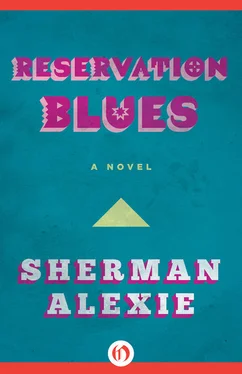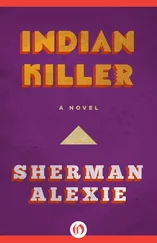“I don’t know,” Thomas said. “We should probably head back.
“Kind of crazy, enit?” Chess asked. “What if you fall asleep driving?”
“Well,” Thomas said. “I’ll stay for a little while. Maybe drink some coffee. How does that sound?”
“Sounds good enough.”
Chess and Checkers jumped into the van with Thomas and directed him to their little HUD house on the reservation. All the lights burned brightly.
“You live with your parents?” Thomas asked.
“No,” Chess and Checkers said.
“Oh. I was just wondering about the lights.
“We leave them on,” Chess said. “Just in case.”
In case of what? Thomas asked in his mind but remained silent.
“Our parents are gone,” Checkers said.
The trio walked into the house, left Victor and Junior in the car, and sat down to coffee at the kitchen table. Checkers emptied her cup quickly and said good night but left her bedroom door open a little.
“Your sister is nice,” Thomas said.
“She’s always crabby,” Chess said, because she knew that Checkers was eavesdropping.
“Oh, I didn’t notice,” Thomas lied.
“Tell me about yourself,” Chess said, because she couldn’t think of anything else to say, because she wanted to know.
“Not much to say,” Thomas replied, feeling shy. “What about you?”
“Well, we grew up on the reservation,” Chess said. “Way up in the hills in this little shack with our mom and dad. Luke and Linda Warm Water.”
“Do you have any brothers or sisters?” Thomas asked.
“Yeah, we had a baby brother, Bobby. We called him Backgammon.”
“What happened to him?” Thomas asked.
“You know,” Chess said, “those winters were always awful back then. Ain’t no IHS doctor going to come driving through the snowdrifts and ice to save some Indian kid who was half dead anyway. I don’t know. We feel less pain when we’re little, enit? Bobby was always a sick baby, born coughing in the middle of a bad winter and died coughing in the middle of a worse winter.”
“I’m an only kid,” Thomas said.
“Did you ever get lonely?” Chess asked.
“All the time.”
“Yeah, you must have,” Chess said. “I get lonely when I think about the winters. I mean, it got so cold sometimes that trees popped like gunshots. Really. All night long. Pop, pop, pop. Kept us awake sometimes so we’d all play rummy by candlelight. Mom, Dad, Checkers, me. Those were some good times. But it makes me lonely to think about them.
Thomas and Chess sipped at their coffee.
“How about your parents?” Chess asked.
“My dad’s still on our reservation, drinking and staggering around,” Thomas said. “But my mom died when I was ten.”
“Yeah, my mom is dead, too.”
“What about your dad?” Thomas asked.
“He went to Catholic boarding school when he was little,” Chess said. “Those nuns taught him to play piano. Ain’t that funny? They’d teach him scales between beatings. But he still loved to play and saved up enough money to buy a secondhand piano in Missoula. Man, that thing was always out of tune.
“He used to play when it was too cold and noisy to sleep. He’d play and Mom would sing. Old gospel hymns, mostly. Mom had a beautiful voice, like a reservation diva or something. Mom taught Checkers and me to sing before we could hardly talk. Bobby slept in his crib by the stove. Those really were good times.”
“What happened after Bobby died?” Thomas asked, although he wanted to know more about her mother’s death, too.
“You know, my dad never drank much before Backgammon died. I mean, he always brought home some food, and Mom always managed to make stews from whatever we had in the cupboards and icebox. We didn’t starve. No way. Checkers and I were just elbows and collarbones, but we didn’t starve.
“It was dark, really dark, when Backgammon died. I don’t know what time it was exactly. But all of us were awake and pretending to be asleep. We just laid there and listened to Backgammon struggle to breathe. His lungs were all filled up with stuff. No. That’s not true. It was just Mom, Checkers, and me who listened. Dad had tied on his snowshoes a few hours earlier.
“‘I’m going for help,’ he said, and none of us said a word to him. Mom helped him put his coat on and then she kissed his fingers before he put on his gloves. Really. It’s still so vivid in my head. Mom kissed his fingertips, ten kisses, before he tramped out the door into the dark.
“I don’t know for sure how long we waited for him. We weren’t even sure he could make it back. He walked out in a Montana snowstorm to find help. He wasn’t even sure what kind of help he was looking for. There weren’t no white doctors around. There weren’t no Indian doctors at all yet. The traditional medicine women all died years before. Dad just walked into the storm like he was praying or something. I mean, even if he made it to other Indians’ houses, like the Abrahamson family or the Huberts, they couldn’t have done much anyway. The Abrahamson family had their own sick kids, and the Huberts were an old Indian couple who didn’t speak English and only stayed alive to spite the BIA.”
“Your father must have been scared,” Thomas said. He didn’t know what to say to Chess.
“Yeah, he must have been really scared,” Chess said. “But I don’t know how far he walked or when he decided to turn back. I always imagined he pounded on some stranger’s door, but there was no answer.
“As he was walking back home, my mother held onto Backgammon and sang to him. Checkers and I lay quietly in the bed we shared. We heard Mom singing and the baby struggling to breathe. I reached across the bed and set my hand on Checkers’s chest to make sure she was breathing. She reached across and did the same on my chest. We felt the rise and fall, the rise and fall. We did that until we heard Mom stop singing and the baby stop breathing.”
Tears welled in Chess’s eyes. She breathed deep and looked at Thomas, who kept silent and waited for the rest of the story. Then Chess excused herself and went to the bathroom, so Thomas just sat at the table and looked around the small, clean house. The kitchen sat in the center, while the living room, two bedrooms, and bathroom surrounded it. Nothing spectacular, but spotless by reservation standards. A clean, clean house.
“Your sister left her light on,” Thomas said to Chess as she came back to the kitchen. “Is she still awake?”
“She might be,” Chess said. “But she does sleep with her light on.”
Just in case, Thomas thought.
“Jeez,” Chess said as she sat down at the table. “You’re probably tired of me babbling, enit? You want some more coffee?”
“No, thanks. I’ll be awake for weeks.”
In her bed, Checkers listened to the conversation and cried a little. She remembered Backgammon. After he died, their mom held him against her chest and cried and cried. Checkers and Chess refused to move from their bed. They knew nothing touched them when they stayed still. Their mom cried even louder after their father stormed back into the room, shouted and cursed like a defeated warrior. He shouted until his wife raised Backgammon up to him like an offering.
Luke Warm Water started to scream then, a high-pitched wail that sounded less than human. Maybe it sounded too human. Colors poured out of him. Red flowed out of his mouth, and black seeped from his pores. Those colors mixed together and filled the room. Chess grabbed Checkers’s hand and squeezed it until both cried out in pain.
“Don’t look,” Chess said to her sister. “Don’t even move.”
The sisters kept their eyes closed for minutes, hours, days. When Chess and Checkers opened them again, they buried Backgammon in a grave Luke Warm Water dug for three days because the ground was frozen solid. When the sisters opened their eyes, Linda Warm Water took a knife to her skin and made three hundred tiny cuts on her body. In mourning, in mourning. When the Warm Waters opened their eyes, Luke traded his snowshoes for a good coat, a case of whiskey, and stayed warm and drunk for weeks. Checkers remembered so much about her father. She was sure she remembered more than her sister ever did and wondered if Chess would tell Thomas any secrets.
Читать дальше












